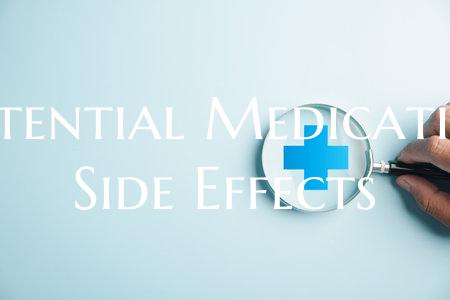
Potential Medication Side Effects
Introduction: When taking medication, it's essential to be aware of the potential side effects that may accompany it. While medication can offer significant benefits in treating various health conditions, some individuals may experience side effects that can range from mild to severe. Understanding potential medication side effects is crucial for making informed decisions about your health and well-being.
Common Side Effects: 1. Nausea and Upset Stomach: One of the most common side effects of many medications is nausea or an upset stomach. This can often be managed by taking the medication with food or adjusting the dosage timing.
2. Dizziness and Drowsiness: Some medications can cause dizziness or drowsiness, especially when taken during the day. It is important to be cautious when operating machinery or driving while experiencing these side effects.
3. Headaches: Another frequent side effect is headaches, which can occur as your body adjusts to the medication. Drinking plenty of water and getting adequate rest can help alleviate this symptom.
4. Allergic Reactions: In some cases, individuals may have allergic reactions to certain medications, resulting in rash, itching, swelling, or difficulty breathing. Seek immediate medical attention if you experience these symptoms.
5. Changes in Appetite: Some medications can affect your appetite, leading to weight gain or loss. Monitoring your food intake and discussing any concerns with your healthcare provider can help manage this side effect.
Serious Side Effects: 1. Liver or Kidney Damage: Certain medications may have adverse effects on the liver or kidneys. Monitoring your liver and kidney function regularly while taking these medications is crucial to avoid serious complications.
2. Blood Clotting Issues: Blood-thinning medications can sometimes lead to an increased risk of bleeding or blood clotting problems. It's essential to be vigilant for signs of unusual bruising or bleeding.
3. Mental Health Changes: Some medications can impact your mental health, causing symptoms such as depression, anxiety, or mood swings. It's important to communicate any changes in your mental well-being to your healthcare provider promptly.
4. Heart-related Issues: Certain medications can affect heart function, leading to irregular heartbeats or other cardiac complications. If you experience chest pain, palpitations, or shortness of breath, seek medical help immediately.
Conclusion: While medication side effects can be concerning, it's important to remember that not everyone will experience them, and many side effects are manageable with proper guidance from healthcare providers. Open communication with your doctor about any side effects you may be experiencing is crucial for ensuring your treatment plan is safe and effective. Always follow your healthcare provider's instructions and never hesitate to seek medical advice if you are concerned about potential medication side effects.